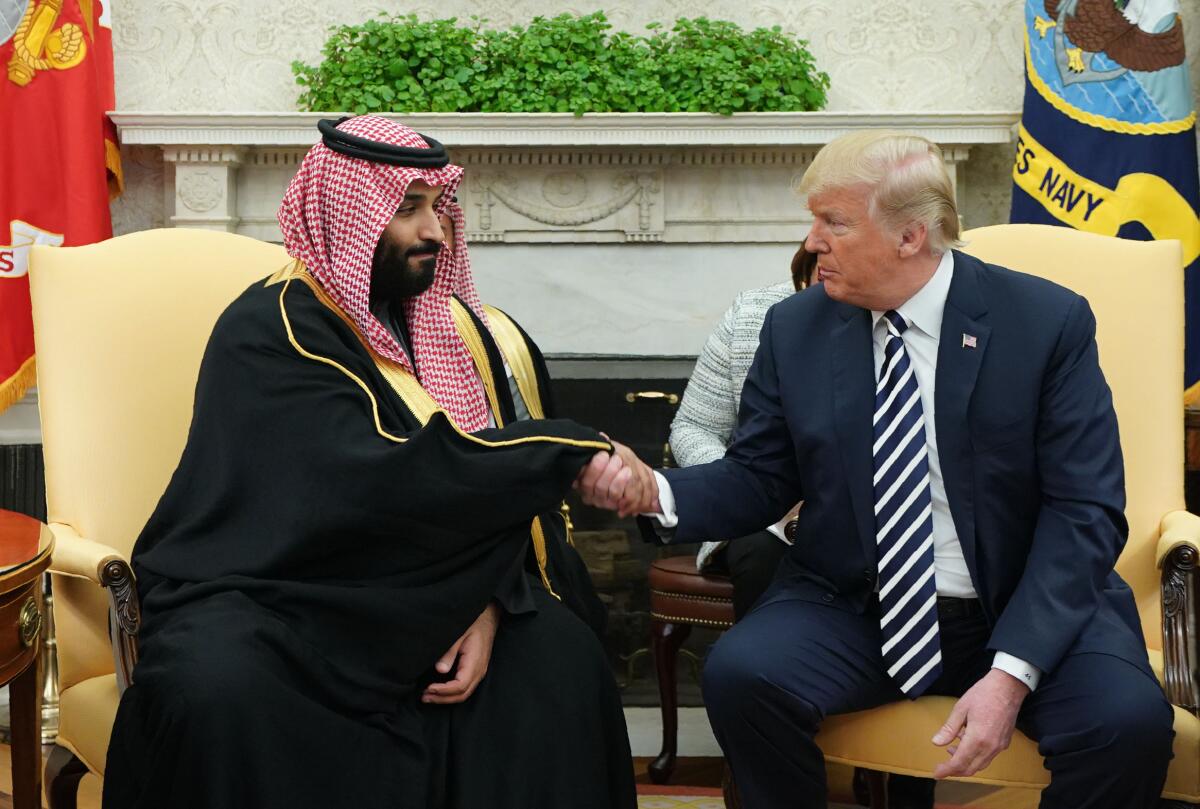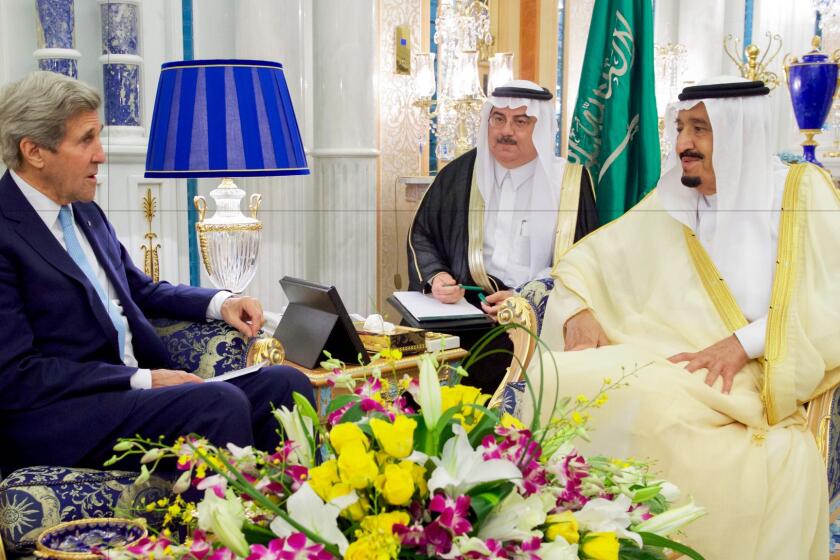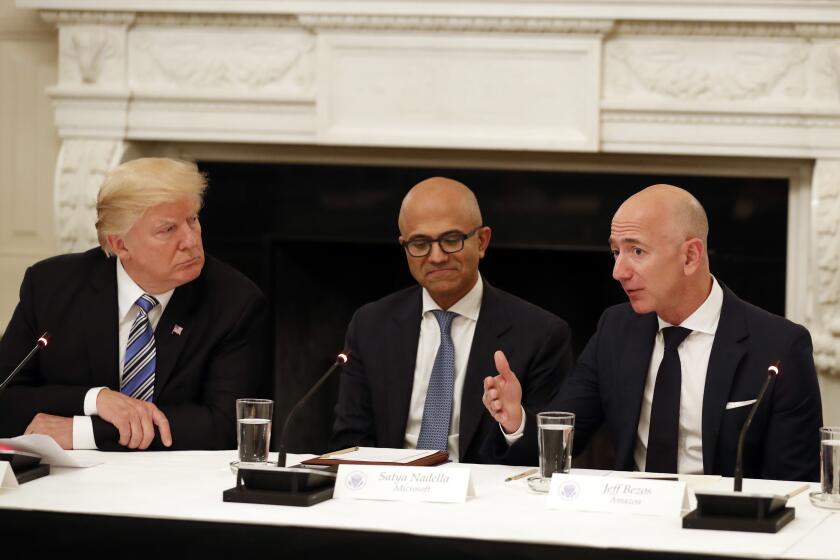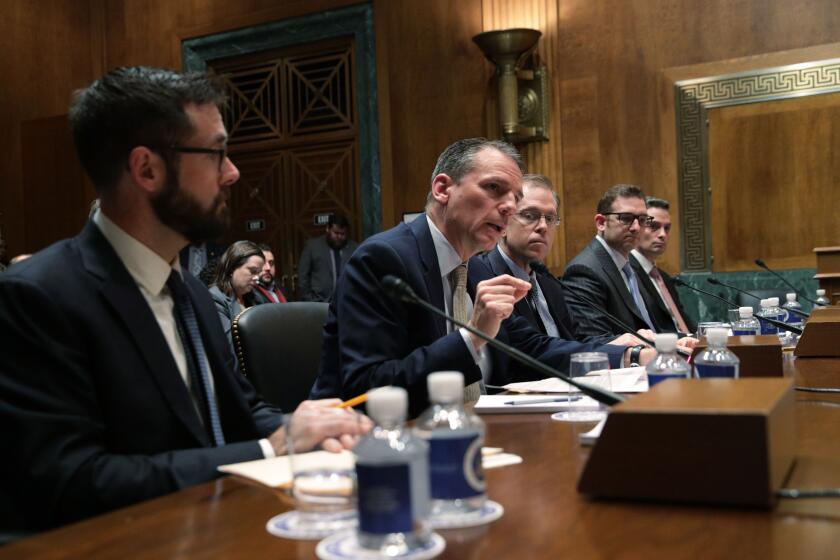Column: If the Khashoggi murder didn’t make Saudi money toxic, the Bezos hack won’t either

- Share via
One would expect that evidence that Saudi Crown Prince Mohammed bin Salman knew of planning for the 2018 murder of Washington Post columnist Jamal Khashoggi — and may even have ordered the killing — would have made the kingdom toxic as a partner for international businesses.
One would expect that allegations that the supposedly reform-minded crown prince was involved in a hack of the iPhone of Amazon.com and Washington Post boss Jeff Bezos would make doing business with Saudi Arabia even more socially unacceptable.
Don’t count on it.
How the efforts unfold for the Saudis to distance themselves from this scandal will be something to watch.
— Robert Mogielnicki, Arab Gulf States Institute in Washington
In the wake of the Khashoggi killing, Saudi Arabia’s stature in the investment community — whether as a destination for investable capital or a source of funding — barely wobbled. Some chief executives who stayed away from the kingdom’s annual “Davos in the Desert” investment conference in October 2018, just weeks after the murder, were back for the 2019 event.
Among the attendees were SoftBank Group CEO Masayoshi Son, who had canceled his speech at the 2018 event. The Saudi government’s Public Investment Fund is the largest investor in SoftBank’s $100-billion Vision Fund, with a $45-billion stake. Whether the Saudis will follow through on their previously reported commitment to make a similar investment in SoftBank’s second Vision Fund isn’t clear.
Nevertheless, international investments in Saudi Arabia have been distinctly on the upswing. Within the last few weeks, Marriott and InterContinental Hotels Group both announced contracts to open or manage hotels in the country, which is heavily promoting itself as a tourist destination. The Formula One racing circuit closed a reported $60-million deal to launch annual races in Jidda, starting next year. Silicon Valley construction start-up Katerra announced a $650-million agreement to build 8,000 homes in Saudi Arabia.
Meanwhile, the giant San Francisco construction firm Bechtel, which has had a presence in Saudi Arabia since the 1940s, contracted to oversee infrastructure projects in the country. In November, Boeing received a $10.7-million contract to upgrade the Saudi air force’s light attack helicopters.
The Saudi regime also remains within the good graces of the Trump administration, which may be a comfort to U.S. companies contemplating investment partnerships.
There are few signs that Saudi Arabia is losing its allure as a source of capital in Silicon Valley or elsewhere. After the Khashoggi killing, the Hollywood talent agency Endeavor, the successor to the William Morris Agency, returned a $400-million investment it had received from the Public Investment Fund, the Saudis’ sovereign investment fund.
But other recipients of Saudi capital have displayed fewer scruples. In 2018, Penske Media Corp., the owner of Variety, Rolling Stone, Women’s Wear Daily and other media properties, announced a $200-million investment from the Saudi Research and Marketing Group, a publicly traded company that is considered to have close ties to the government. Variety reported in December that SRMG remains an investor in Penske.
As my colleague Christopher Knight has reported, Desert X, the biennial exhibition of site-related installation art shown throughout the Coachella Valley, is about to open an exhibition in Saudi Arabia — a step condemned within the international art community as helping the regime paper over the Khashoggi killing.
The highest-profile recipient of Saudi venture capital is Uber, which received a $3.5-billion investment in 2016, then touted as the largest direct investment by a foreign government in a U.S. start-up. At the time of Uber’s initial public offering last year, the Saudi Public Investment Fund owned 5.3% of the company. The fund’s managing director, Yasir Al-Rumayyan, still sits on the Uber board.
The Treasury Department on Monday opened the curtain on one of our longest-lasting, and strangest, state secrets: how much U.S. debt does Saudi Arabia own?
“There are many global CEOs who look at Saudi Arabia as a very promising market,” says Robert Mogielnicki, a resident scholar at the nonprofit Arab Gulf States Institute in Washington. Although details of the Bezos hack are still murky, the scandal isn’t seen as “necessarily linked to the larger Saudi business environment.”
The case of Saudi Arabia can be seen as a parable of capitalism or a parable of morality. If one sees capitalism’s cardinal principle that capital will flow to where the opportunities beckon the most, then the flow of money into Saudi Arabia or the willingness by companies to accept investment when it’s cheapest and most available is part of the natural order of things.
On the other hand, capital isn’t autonomous. Decisions on where to invest or whom to invest with are made by humans. By that token, choosing to invest in or with a regime complicit in murder reflects moral turpitude.
There’s a place where these two aspects come together. Arguably, a regime that will countenance extrajudicial murder or surreptitiously invade the privacy of those it regards as its critics may not be the safest place to invest, because its leaders can’t be trusted to adhere to the law or refrain from more scandalous behavior.
“This is a country that is controlled by a dictator,” says Ali Al-Ahmed, a Saudi critic who is founder and director of the Institute of Gulf Affairs. “It’s very hard to be on the safe side when this is the environment.” In states that observe the rule of law “there is a bandwidth of certainty; in Saudi Arabia there is not.”
Amazon has reason to complain that Trump tainted a huge Pentagon contract award.
It isn’t unprecedented for companies to do business with regimes of notorious noxiousness. The war profiteer — the business leader who reaps profits from carnage — has been a stock cultural character since even before George Bernard Shaw put him on stage in his 1905 play “Major Barbara.”
In our own time, several U.S. companies have sold high-tech components to China’s surveillance industry, which has targeted ethnic Uighurs and other Muslim minorities that have been subjected to detention and forced assimilation with the ethnic Chinese majorities, according to human rights groups.
Alphabet, the parent company of Google, has faced controversy over allegations that it worked on a censorship-friendly version of its search engine, known internally as Dragonfly, for the Chinese government. Company CEO Sundar Pichai acknowledged the existence of Dragonfly in 2018, but not that it was aimed at facilitating censorship.
The project drew a public protest by Google employees. Several shareholder resolutions filed for the company’s 2019 annual meeting were critical of the effort and one sought disclosure of the “impacts of censored Google search in China.” All were opposed by Alphabet management and went down to defeat, in part because a commanding majority of votes are controlled by Google founders Sergei Brin and Larry Page. Soon after the annual meeting, the company said it had “terminated” Dragonfly.
Trump himself has acknowledged having had business ties with Saudi interests.
To help see the Saudi case more clearly, let’s briefly review what’s known about the Khashoggi killing and the Bezos hack.
Khashoggi, an outspoken critic of the Saudi regime, was killed at the Saudi consulate in Istanbul on Oct. 2, 2018. The CIA has concluded that the killing was ordered by the crown prince, who is known familiarly by his initals MBS. The Saudi government has denied the prince’s involvement, and last month sentenced five people to death for the murder. But the government also freed two suspects close to MBS, raising further doubts about his innocence.
The murder is the subject of a documentary titled “The Dissident,” which will be unveiled Friday at the Sundance Film Festival. The film reportedly is critical of U.S. companies that continue to partner with the Saudis, which may turn up the heat on those businesses.
The evidence of the role of the crown prince in the hacking of Bezos’ phone is more equivocal. The technical experts hired by Bezos found enough to conclude “with medium to high confidence that Bezos’ iPhone X was compromised via malware sent from a WhatsApp account used by Saudi Crown Prince Mohamed bin Salman.” The malware prompted the phone to transmit an immense volume of data, much of which was private.
The kingdom has called the allegation “absurd.” But the technical findings were strong enough to prompt Agnes Callamard, the U.N. special rapporteur on summary executions and extrajudicial killings, and David Kaye, the U.N. special rapporteur on freedom of expression, to connect the dots between the Khashoggi murder and the Bezos hacking.
Whole Foods throws hundreds of part-timers off its health plan, as Jeff Bezos reneges on his pledge to dump shareholder value managing.
The hacking and surveillance of Bezos “strengthen support for further investigation by U.S. and other relevant authorities of the allegations that the crown prince ordered, incited, or, at a minimum, was aware of planning for but failed to stop the mission that fatally targeted Mr. Khashoggi in Istanbul,” they stated. “At a time when Saudi Arabia was supposedly investigating the killing of Mr. Khashoggi, and prosecuting those it deemed responsible, it was clandestinely waging a massive online campaign against Mr. Bezos and Amazon targeting him principally as the owner of the Washington Post.”
According to the technical report, as Callamard and Kaye observed, phones of several dissident associates of Khashoggi also were hacked. These incidents, the U.N. officials asserted, are the tip of the iceberg of an unregulated surveillance culture.
They called the Bezos hacking “a concrete example of the harms that result from the unconstrained marketing, sale and use of spyware” and called for “surveillance through digital means [to] be subjected to the most rigorous control, including by judicial authorities and national and international export control regimes, to protect against the ease of its abuse.”
Up to now, however, none of this has had much of a detectable effect on Saudi investment flows — incoming or outgoing. “It’s hard to say what the ultimate damage is, in terms of foreign investment,” says Karen E. Young of the American Enterprise Institute. “It’s at too much of an early stage to see who’s been deterred.”
California’s privacy law kicks in Jan. 1, but it’s just a start
The foreign companies that remain most involved in Saudi Arabia are “those that have been there for a long time anyway,” Young told me. “They’ve been less successful at attracting new entrants.”
As for equity investments, Saudi Arabia was officially designated an emerging market last year through its inclusion in the FTSE Russell Emerging Markets Index. That’s expected to prompt an inflow of billions of dollars of passively invested money into Saudi companies. “Many investors may be invested in Saudi Arabia and not even know it,” Young says.
What’s likely to attract global capital into Saudi Arabia is the story that MBS is intent on liberalizing its economy. This has two main goals. One is to wean the kingdom from its dependence on oil, and the other is to privatize companies that long have been state-owned. According to the Atlantic Council, a nonpartisan think tank, the Saudi government employs about two-thirds of all working Saudis, and public sector employment accounts for about a third of total employment, much higher than in the developed world.
The Saudis have set forth an ambitious project to accomplish those ends, known as Vision 2030. The idea is to create homegrown technological and defense industries virtually from scratch, a program that necessarily will accommodate — indeed, probably require — considerable investment from overseas.
The regime has made overt efforts to develop its tourism, hospitality and entertainment industries, relaxing social codes — there will no longer be restrictions for unaccompanied women, for example — and liberalizing visa requirements for visitors from the U.S., Europe and parts of Asia. Alcohol will still be banned, however.
Last year the regime signed a new 10-year contract with the wrestling event company WWE, although the relationship was rattled by the Khashoggi killing. In announcing its third-quarter 2018 results at the end of that year, WWE observed that “considering the heinous crime committed at the Saudi consulate in Istanbul, the company faced a very difficult decision as it relates to its event scheduled for Nov. 2 in Riyadh.” But it added, “similar to other U.S.-based companies who plan to continue operations in Saudi Arabia, the company has decided to uphold its contractual obligations to the General Sports Authority and stage the event.”
The Saudis have made other attempts to move into the mainstream of international trade. This November it will host the summit of Group of 20 leaders in Riyadh for the first time.
Whether some companies will start to shun Saudi investments because of scandal is hard to say. Silicon Valley is highly dependent on Saudi cash, much of it via investments from SoftBank’s Vision Fund.
“How the efforts unfold for the Saudis to distance themselves from this scandal will be something to watch,” Mogielnicki said of the Bezos hacking. “I would expect that the Saudi government will try to package this hacking scandal as one of the unfortunate incidents that unfolded around the Khashoggi murder and the fallout, and that it’s from a period that the government is trying to put behind it, as from a different time. That is something that will make it easier for the global business community to quietly push ahead with their work in Saudi Arabia.”
More to Read
Inside the business of entertainment
The Wide Shot brings you news, analysis and insights on everything from streaming wars to production — and what it all means for the future.
You may occasionally receive promotional content from the Los Angeles Times.














